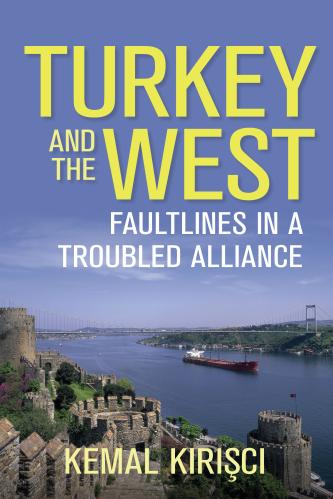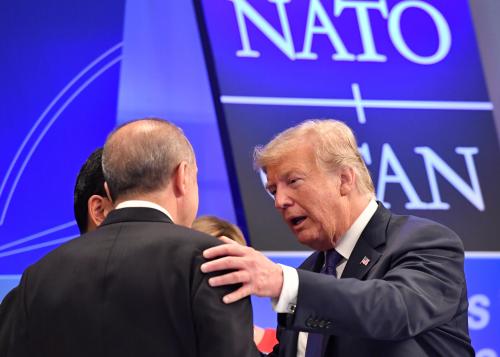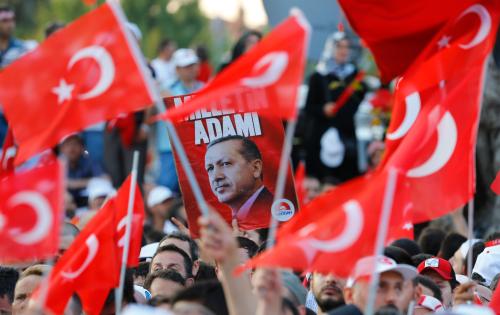With U.S.-Turkey relations at a low point, Turkish Prime Minister Binali Yıldırım visits Washington this week for a meeting with Vice President Mike Pence. It is not clear whether rule of law will make the cut, writes Amanda Sloat, though visas, terrorists, and court cases are all on the agenda. This piece originally appeared in Foreign Policy.
Amid a low point in U.S.-Turkey relations, Turkish Prime Minister Binali Yıldırım will visit Washington this week for a meeting with Vice President Mike Pence. Visas, terrorists, and court cases will be on the agenda. Less clear is whether rule of law will make the cut.
This long-planned meeting, which follows their first encounter last February in Munich, usefully broadens engagement beyond both countries’ brash leaders. The May visit of Turkish President Recep Tayyip Erdoğan to see President Donald Trump was marred by scenes of Turkish bodyguards beating up protestors. Yıldırım, an ally of Erdoğan for over two decades and fellow founder of the governing Justice and Development Party (AKP), took office in May 2016; after a referendum this spring endorsed constitutional changes, he resigned as AKP leader and Erdoğan was elected as his successor. Yıldırım and Pence, low-key personalities who have their bosses’ ears, should have a substantive policy discussion.
The highest-profile agenda item is the mutual suspension of visas for each other’s citizens. American action followed arrests of two Turkish employees of U.S. consulates: one in Adana accused of links to Kurdish terrorists and one in Istanbul accused of ties to Fetullah Gulen, the U.S.-based cleric accused of directing the coup attempt in July 2016. The Turkish government took reciprocal measures in response. It views this situation as a visa dispute, while Washington has characterized it as a question of “the commitment of the Government of Turkey to the security of U.S. Mission facilities and personnel.” While both governments are keen to return to a normal state of travel affairs, the United States is seeking evidence for the detentions and assurances about mission safety. (After two calls last weekend between Secretary of State Rex Tillerson and Turkish Foreign Minister Mevlut Cavusoglu, the United States announced on Monday the re-opening of limited visa services. The U.S. embassy’s statement said this decision came after receiving initial assurances no additional staff are under investigation; however, it expressed continued concern about existing cases against local employees and American citizens.)
The purported justification for these arrests stems from threats to Turkish national security: namely, Gulen and the Kurds. On the former, Turkey imposed a state of emergency after the failed July 2016 putsch and began arresting suspected coup plotters and affiliated Gulenists. Ankara has called for Gulen’s extradition from the United States, though it has failed to provide sufficient evidence of his culpability to persuade a federal judge of probable cause. On the latter, the Turkish government has fought for decades against a domestic Kurdish terrorist organization (PKK). The Kurdish question has grown more complicated in recent years, with the United States providing military support in the fight against the Islamic State to a faction of Syrian Kurds (YPG) affiliated with the PKK. Turkey has some legitimate concerns on both issues that should continue to be discussed at senior levels.
However, these arrests stem from a broader problem: rule of law. Efforts to bring coup plotters to justice have morphed into an apparent witch-hunt against all political opponents. The Turkish government has aggressively pursued an ever-expanding number of people accused of engaging in ill-defined acts of terrorism. At least 150,000 people have been sacked from government and academia; more than 50,000 are jailed for alleged collusion; and over 150 journalists are behind bars. Now foreigners are getting caught in the net. In addition to these U.S. consulate employees, 12 Americans are in Turkish prisons on spurious terrorism charges. The highest profile case is Andrew Brunson, a pastor who was jailed a year ago on accusations of supporting Gulen. Pence, who shares Brunson’s Christian faith, has already engaged the Turkish government on his behalf.
Erdoğan appears to be engaging in “hostage diplomacy.”
He likely sees American prisoners as useful bargaining chips, as both countries question the independence and flexibility of the other’s legal system. After Trump requested Brunson’s release in a September phone call, the Turkish president stated publicly that he had informed his American counterpart he would hand over one cleric if he got the other cleric in return. In other words, Turkey would release Brunson if the United States provided Gulen.
Arguably of even greater interest to Erdoğan is Reza Zerrab, a Turkish-Iranian gold trader arrested in March 2016 on charges of violating American sanctions by using gold to purchase Iranian gas. Erdoğan, who seemingly fears he or his family could be implicated in the scheme, has raised Zerrab’s case with Trump.
Addressing all of these cases requires a conversation about rule of law, as the American-related arrests did not occur in a vacuum. Unfortunately, the Trump administration has given the impression it is does not care about the quality of Turkish democracy. Concerns that President Trump neglected to raise human rights issues during his May meeting with Erdoğan were compounded by the bodyguards’ violent behavior—just hours after the Turkish president’s motorcade left the White House. Although the State Department has made strong statements in recent months about the troubling arrests of human-rights activists, the silence from the White House has been deafening.
This has been exacerbated by perceptions the White House is willing to explore extra-judicial means of resolving Ankara’s problems. For example, Michael Flynn—who served as Trump’s first national security advisor—reportedly talked to Turkish officials during the campaign about transferring Gulen from the United States to Turkey, outside the legal process. Developments in the Zerrab case have also raised eyebrows. Trump fired Preet Bharara, the U.S. district attorney who indicted Zerrab. Then Zerrab hired Rudy Guiliani, an informal Trump advisor, as part of his defense team. And Zerrab’s lawyers said they were seeking a “diplomatic solution” to his case, with Guiliani holding meetings with Erdoğan and senior U.S. administration officials to discuss options. (Reports that Zerrab may be seeking a plea deal suggest this effort failed.)
An increasing number of analysts in the United States and Europe are calling for a transactional relationship with Turkey.
Recent events highlight the limits of this approach. That game is hard to play cleanly, not least because of legal constraints. Instead, there should be a broad-based dialogue that covers a range of issues, including rule of law as a core component. During his meeting with Prime Minister Yıldırım, Vice President Pence must place this issue firmly on the bilateral agenda.
The Turkish government pays careful attention to messaging from Washington and has undoubtedly noted the disparity in commentary within the Trump administration. Turkish political leaders should understand their undemocratic behavior is problematic for a NATO ally, and Turkish civil society needs to know the U.S. supports their efforts to keep the country on a democratic trajectory. Unless and until the White House raises governance concerns, Turkey’s leadership will assume the United States is giving them a pass.
The Brookings Institution is committed to quality, independence, and impact.
We are supported by a diverse array of funders. In line with our values and policies, each Brookings publication represents the sole views of its author(s).








Commentary
The Trump administration can’t give Turkey a hall pass on rule of law
November 7, 2017